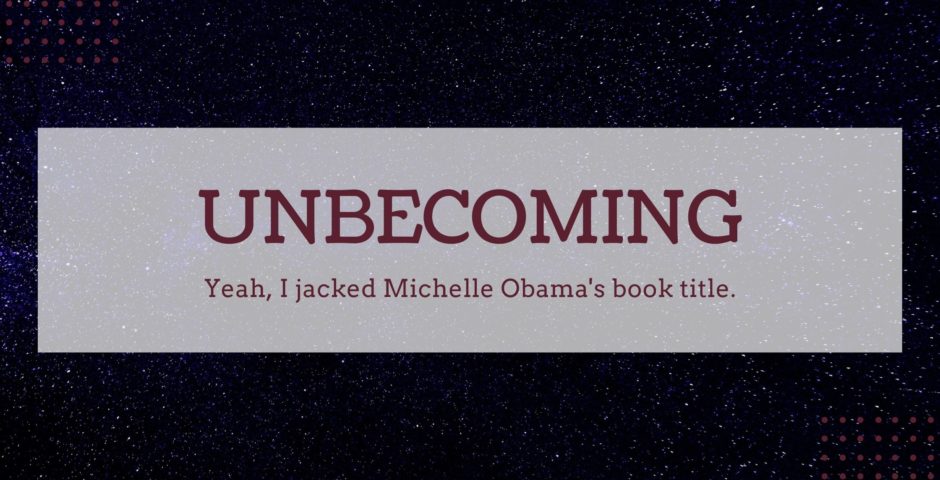
Who Did You ‘Unbecome’ During the Pandemic?
It has been 375 days since our first lockdown order was issued in South Africa: Alert Level 5. You know the story. It was supposed to last for 21 days after which, like a hoard of butterflies we would emerge from our respective dwellings and launch back into “normal life”. The soul-reaping virus would be held at bay – perhaps even nearly defeated(?). That’s what we’d hoped for, but that’s not what happened, because as one Twitter user astutely observed:
21 days stretched into more weeks; and then into months; and now here we are, a year-and-some-change later witnessing all kinds of changes around us and more importantly within us.
Everything we knew about how to navigate life in a “normal world” had to be chucked out of the window and for the first time in recent memory, you could see social disparities and chart outcomes in real time. Those who sat on the wrong side of the digital divide had it worst. Whether you could continue to earn an income, feed your family, or continue your education was completely dependent on access to the Internet, electricity and/or some sort of tech device. These were markers of success. Access and possession of these resources determined how far you would/could progress during the pandemic – and beyond. The writing was on the wall, clear and without need of interpretation. There were many uncomfortable questions that would need answering.
In the early days of the pandemic – right around when global economies began their cascading and successive collapses – there were interesting conversations in the national media about what romantic relationships would look like in a time where people, but men most especially, were not working and had no prospects for earning income. A relationship expert had been invited to speak on the issue, and as you might expect, passions ran high from callers-in, ranging from anger to hopelessness. These were the observations that struck a chord:
So much of a man’s identity is tied to what work he does and how much he earns. And when he has to come home and look at his wife/children in the face and admit that he can no longer provide for the family because his unskilled job has been taken away, it deals a blow to his masculinity. For the single man, it becomes difficult (if not impossible) to date, because societal expectations dictate that he uses money as a carrot to entice a potential paramour.
None of this is particularly groundbreaking stuff, but what the expert did say that captured my attention was this: “This pandemic provides us all with an opportunity to examine ourselves and determine who we are outside of our jobs and the work we do.”
WHO ARE YOU?
This is a difficult question to answer, for the very reason(s) illustrated above. Many of our cultures and traditions teach us to marry our individual identities to our labor and productivity. I’ll give you an example. Ask any Ghanaian child who their father is and the response will likely be some variation of:
“My father is Kofi X. He is a welder.”
We don’t know if Kofi is a generous man, a wise or a foolish man, or a man who holds a peculiar set of beliefs. He’s introduced by his name and occupation. His work is what gives him value. Majority of the time, if we were to ask Kofi who he is, he would reply, “I am a welder.” In 40 years, he’d say, “I’m a retired welder.” Most people go through this life never knowing or developing the curiosity to discover who they are.
I used men in this example because they were the focus of the conversation the interview that day, but the same applies to women. Do were ever create the space or give ourselves permission to have that internal dialogue? To interrogate who we are outside of the parameters patriarchal definitions of womanhood? A friend of mine once shared her frustration about these definitions in this way:
As women, our identifies are tied to the existence of and our relationship to men. A man/boy is “Mr.” his whole life. A woman is:
Ms, if we’re unsure if she’s married or single.
Miss, if she’s confirmed single.
Mrs., if she’s married.
Depending on one’s cultural context, the possession of one or either title will make navigating society more pleasant or more difficult, and that’s not even taking into consideration the additional burden of tying value and identity to labor. The pandemic decimated female dominated industries – like childcare, food preparation and personal services – exposing a shocking gender gap.
These are real issues, and while a raging pandemic might not seem like the best time to do a deep dive into Freud’s id, ego and superego analysis of self…perhaps it may have just been that. The capitalist structures that we all inhabit compel us to bind our worth to the often-exploitative vision of conglomerates and ensure their survival. This is what it means to contribute positively to society – to work and enrich a select group of people. It only makes sense that there is such a crusade to get things back to “normal” before we have an opportunity to renew our minds, visions and versions of ourselves: an unbecoming.
Please don’t interpret this post as a radical call to arms or revolution. I’m simply asking if you survived this pandemic – as I and my family have been blessed to have had – did you emerge different or very much the same? Was there a need to “unbecome”?
Who are you?




